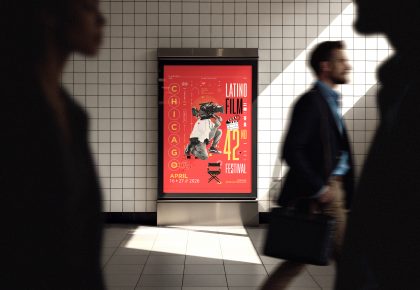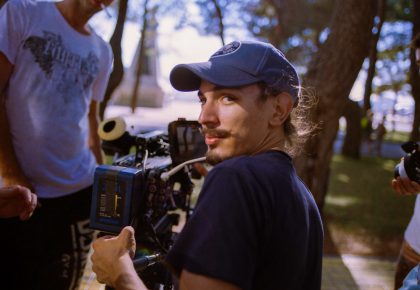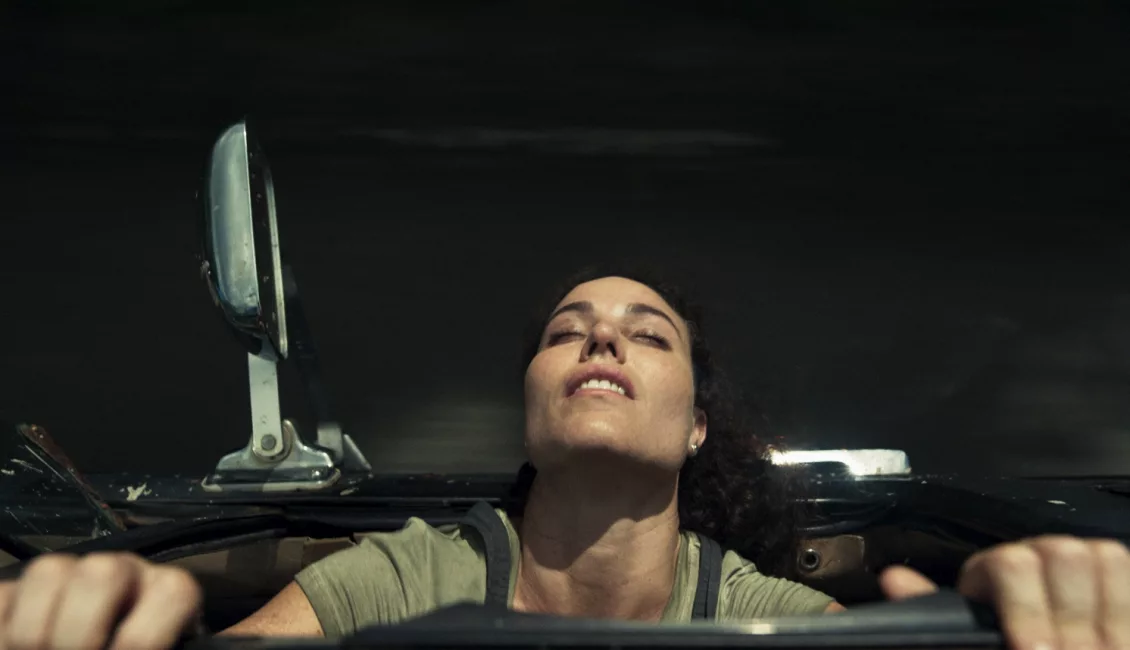
This content has been archived. It may no longer be relevant
CHICAGO (March 7, 2023) – The 39th Chicago Latino Film Festival announces the first wave of titles from the close to 100 feature and short length films from Latin America, Spain, Portugal and the United States confirmed for the event.
Fresh off a Golden Globe win for Argentina, 1985 (Best Foreign Language Film), Argentinian director Santiago Mitre’s hilarious dark comedy 12 Ways to Kill Your Neighbor leads this first wave which includes such Festival darlings as Valentina Maurel’s feature debut I Have Electric Dreams (Winner of the Best Director, Best Actress and Best Actor Award at the Locarno International Film Festival), Paz Encina’s Eami (Winner of the Tiger Award at the 2022 Rotterdam International Film Festival) and Chicago-based multidisciplinary artist Glorimar Marrero Sánchez’s feature debut The Fishbowl, the first Puerto Rican film to ever premiere at Sundance. Full summaries below.
Produced by the International Latino Cultural Center of Chicago, the 39th Chicago Latino Film Festival will run from April 13th to April 23rd.
Opening and Closing Night will be held at the AMC River East 21 Theaters, 322 E. Illinois St. and a special event at the Instituto Cervantes, 31 W. Ohio St., with the rest of the Festival taking place at the Landmark Century Center, 2828 N. Clark St. Opening and Closing Night selections will be announced next week with the rest of the program announced on Tuesday March 21st coinciding with the launch of the Festival’s redesigned website and the distribution of the first print schedule since the pandemic. In the meantime, visit latinoculturalcenter.org for more information.
“Iberoamerican cinema has been delivering an abundance of riches since the turn of the century. This first wave of titles not only offers film lovers a good overview of what to expect at this year’s Festival but also a sample of the diversity of topics, genres and forms embraced by these filmmakers as well as our trademark focus on the Indigenous and Afro-Latino experiences,” said Pepe Vargas, founder and executive director of the International Latino Cultural Center of Chicago.
THE FIRST WAVE: FEATURES
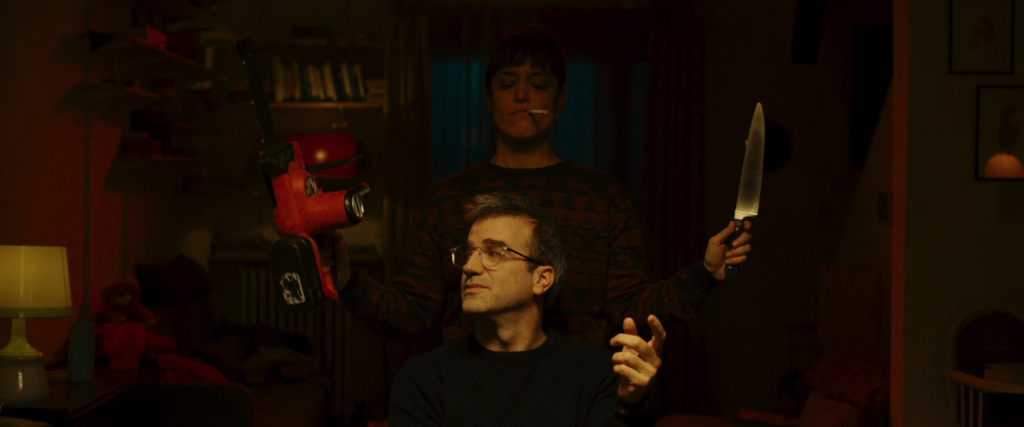
Daniel Hendler in 15 Ways to Kill Your Neighbor
- 15 Ways to Kill Your Neighbor/Flor pequeña (Argentina/France; Director: Santiago Mitre): From Santiago Mitre, the director of Argentina, 1985, comes this deliciously twisted dark comedy about a man who refuses to die. José (Daniel Hendler) has moved to France with his partner and daughter. Unemployed, José refuses to learn French. One day, this stay-at-home dad knocks on his neighbor’s door to borrow a shovel; he is welcomed in by Jean-Claude (Melvil Poupaud), a bon-vivant. Jean-Claude rubs him the wrong way and José impulsively kills him with the shovel. Much to his chagrin, he discovers his new neighbor alive and well the following morning. Now he must kill him again…and again…and…
- Blanquita (Chile/Mexico/Luxembourg/France/Poland; Director: Fernando Guzzoni): Inspired by real events, Chile’s official selection for the Academy Award for Best International Feature centers on Blanquita, an 18-year-old single mother who, encouraged by Manuel (Alejandro Goic), the priest who manages the foster home she lives in, becomes a key witness in the case against a child prostitution and pedophilia network run by a well-known businessman. Even though her accusation is corroborated, powerful interests begin to poke holes in their story. But Blanquita won’t back down.
- I Have Electric Dreams/Tengo sueños eléctricos (Costa Rica/Belgium/France; Director: Valentina Maurel): Winner of the Best Director, Best Actress and Best Actor Award at the Locarno International Film Festival and the Horizon Awards at San Sebastian, Valentina Maurel’s feature debut focuses on Eva, a strong-willed and restless 16-year-old girl who lives with her mother, her younger sister and their cat, who desperately wants to move in with her estranged father. Clinging onto him as he goes through a second adolescence, she balances between the tenderness and sensitivity of teenage life and the ruthlessness of the adult world.
- Daughter of Rage/La hija de todas las rabias (Nicaragua/Mexico/Netherlands/Germany/France/Norway/Spain; Director: Laura Baumeister): Set against the backdrop of protests criticizing the government’s decision to privatize the waste services, Baumeister’s powerful feature debut tells the story of a mother and a daughter who live near Nicaragua’s largest landfill. Lilibeth and her 11-year-old daughter María make a living by recycling scrap metal and breeding their dog to sell the puppies. After running afoul of a local thug, Lilibeth leaves María with the owners of a recycling center where she must stay and work. There she meets Tadeo, who will help her reunite with Lilibeth.
- Eami (Paraguay/Argentina/Mexico/Germany/France/Netherlands/United States; Director: Paz Encina): Winner of the Tiger Award at the 2022 Rotterdam International Film Festival and Paraguay’s official selection for the Academy Award for Best International Feature, Paz Encina’s sensorial documentary hybrid reveals the impact of deforestation over Paraguay’s Ayoreo Totobiegosode native people through their own mythology. The Asojá, the bird-god-woman, takes the form of 5-year-old Eami, who is in a trance after her village is destroyed. Her memories are the only way to keep her people alive.
- The Fishbowl/La pecera (Puerto Rico/Spain; Director: Glorimar Marrero Sánchez): One of the few Puerto Rican films to premiere at Sundance, interdisciplinary artist Marrero Sánchez’s feature debut follows ailing artist Noelia who, after learning that her cancer has metastasized, leaves her partner behind in San Juan and moves in with her mother on the island municipality of Vieques. She keeps secret her condition so she can live life on her own terms, including joining in the efforts to document the toxic legacy of the U.S. military exercises in the island.
- Amigo (USA; Director: Luis Gispert): Set in the Spanish-speaking black enclaves of Miami, New York / Miami based visual artist Luis Gispert’s feature debut follows Tomás, an immigrant laborer with a murky past who fled his country by shipping himself in a crate to the US. Tomás is living off the grid, performing odd-jobs for an upper-middle class family, saving money in the hopes of eventually buying a home for his estranged family that he left behind. A series of events forces Tomás out of his solitary life to engage with people in his community in search of something lost.
THE FIRST WAVE: SHORTS
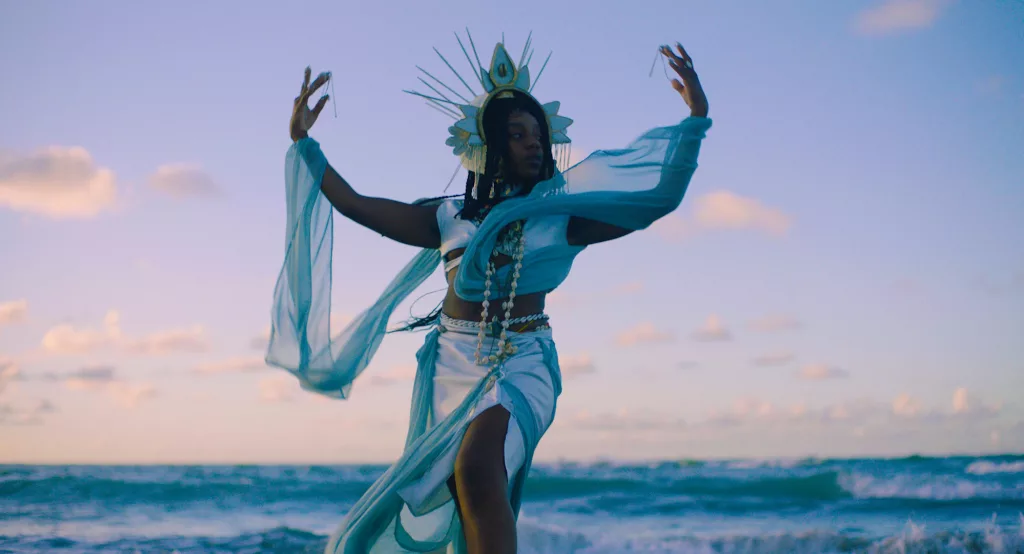
- Sad Machines/Las máquinas tristes (Argentina; Director: Paola Michaels): Robots and machines have become sentient. They complain while talking about their own existence. They question who they are and what they’re doing, doubting whether they belong in the environment they inhabit. Choices and skills become interrogated, destiny and chance. The ontology of machines. The machines are sad.
- Agustina (Mexico; Director: Luciana Herrera Caso): Agustina is a girl with a great imagination. When she discovers that the trip to the moon that her teacher had promised her is only imaginary, she becomes devastated. A conflict develops in her country and Agustina has to find her own way to face reality.
- Daughter of the Sea (USA; Director: Alexis García): An ominous vision preempts the passing of Yanise’s grandfather. Unable to return to Puerto Rico immediately, Yanise (rapper Princess Nokia) arrives three months later and is welcomed by her mom, grandmother, and cousins. At breakfast, she describes a recurring dream of being held in the ocean. Her grandmother recognizes it as a calling from Yemayá.
TICKET INFORMATION
Tickets to each regular screening at the Landmark Century Center are: $15, general admission; $12 (with valid ID), ILCC members, students and seniors. Festival passes worth 10 admissions for the in-person screenings are: $125 for the general public and $105 for ILCC Members, students and seniors.
Tickets go on sale Tuesday, March 21. For more information, visit: latinoculturalcenter.org
SPONSORS
The 39th Chicago Latino Film Festival is sponsored by: Tito’s Hand-made Vodka, Humboldt Park Health, US Bank, Xfinity, Lopez & Co., The Whitehall Hotel, Tristan & Cervantes, Illinois Film Office, Consulate of Chile, Prado & Renteria and Instituto Cervantes
Media Sponsors: WBEZ/Vocalo, WTTW, CAN-TV, La Raza, Telemundo Chicago/NBC-5, Chicago Latino Network, LatinBisToday, InSpanish, DBO Films
ADDITIONAL SUPPORT
The 39th Chicago Latino Film Festival receives additional support from: Chicago’s Cultural Treasures, Reva & David Logan Foundation, Paul M. Angell Family Foundation, The Joyce Foundation, Gaylord & Dorothy Donnelley Foundation, The Field Foundation, MacArthur Foundation / Prince Charitable Trusts, League of Chicago Theaters/ComEd, Art Works Fund, DCASE, National Endowment for the Arts and Illinois Arts Council
ABOUT THE ILCC
The International Latino Cultural Center of Chicago is a pan-Latino, nonprofit, multidisciplinary arts organization dedicated to developing, promoting, and increasing awareness of Latino cultures among Latinos and other communities by presenting a wide variety of art forms and education including film, music, dance, visual arts, comedy, theater and culinary arts. The Center prides itself for its outstanding multidisciplinary local and international cultural programming which spans Latin America, Spain, Portugal, and the United States.
Born out of the Chicago Latino Film Festival, The International Latino Cultural Center of Chicago also produces other programs, including the Chicago Latino Music Series, which is celebrating its 17th edition this year; Film in the Parks, also in its 17th season; the monthly Reel Film Club, already in its 15th year; and many others.
All in all, the audience has grown from 500 people in 1985 for the first Chicago Latino Film Festival to more than 70,000 (Latinos and non-Latinos) who enjoy the year-round multidisciplinary cross-cultural exchanges offered by the Center.
